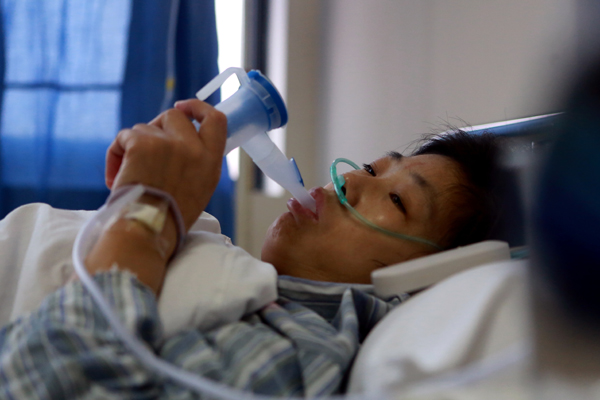Lack of safety training blamed for deaths
Updated: 2013-09-02 00:46
By Wang Zhenghua (China Daily)
|
|||||||||||
Accident due to cap that broke off liquid-ammonia pipeline system
People who were injured in a deadly liquid-ammonia leak remained hospitalized on Sunday, as workers blamed a lack of safety training at their company for the many deaths and injuries in the accident.
The leak of the industrial refrigerant from the refrigeration unit of Shanghai Weng's Cold Storage Co on Saturday killed at least 15 people and injured 25 others, five seriously.
 |
|
An injured worker receives treatment at a hospital in Baoshan district, Shanghai, on Saturday. Fifteen people were killed and 25 others injured, five critically, after a liquid ammonia leak from a refrigeration unit of Shanghai Weng’s Cold Storage Co on Saturday, local authorities said.Liu Xin / For China Daily |
The municipal government said on Sunday that the cause of the accident was a cap that broke off the company's liquid-ammonia pipeline system, and has ordered a safety check at all companies that use the refrigerant.
The city's health authority said the 25 injured workers are in stable condition.
Shortly after the accident occurred at 10:50 am on Saturday, most of the injured, whose respiratory systems were burned, were taken to nearby Dachang Hospital in the city's northern Baoshan district. As of Sunday, 10 workers who suffered minor injuries remained hospitalized at the hospital, while 15 others have been transferred to other medical institutions for further treatment.
"The 10 injured people at Dachang Hospital are in stable condition, and their main symptoms are pain in the pharynx," said Huang Jianrong, a publicity official of Baoshan district.
Some of the injured will be able to leave the hospital as soon as Monday, the official said, citing the doctors.
At Changhai Hospital of Shanghai, seven workers were in its intensive care unit.
Doctors said inhaling the poisonous gas damaged the mucous membranes of the workers' respiratory tracts, making it difficult for them to breathe.
The Third People's Hospital, affiliated to Shanghai Jiao Tong University's Medicine School, operated on a female victim, cutting open her respiratory tract, said Xu Peng, an assistant director of the hospital. On Saturday afternoon, the hospital opened an express admission for those injured in the accident.
The city's top leader Han Zheng has ordered officials to deal with issues related to those killed in the accident. Hospitals said some victims' faces were disfigured by the corrosive chemical, making their bodies hard to identify.
Shanghai is considered more tightly regulated than other Chinese cities, but some say the accident revealed shortcomings in worker safety at some of its factories.
On Sunday, some workers said Shanghai Weng's employed them on a short-term contract and did not provide the necessary safety training or give enough information about liquid ammonia.
"I was processing shrimp in the workshop when we heard a ‘bang', and the room was quickly filled with white smoke," said Yin Yuqin, 42, who remained hospitalized at the Third People's Hospital.
"There was so much smoke that we couldn't see anything," she added. "But we still did not realize the gas was poisonous. We only smelled a pungent odor."
Another survivor, Zhang Ping, told local media that she was sleeping in the third-floor dormitory when she was awaked by the noise and tried to rush downstairs. But the discomfort from the chemical forced her back. Emergency workers later carried her out.
Zhang and about 20 other employees sought shelter at a restroom in the factory, covering their noses and mouths with wet paper towels until they were rescued.
Most of the workers said they were employed on a two-month contract from the provinces of Shandong, Anhui and Henan. They also accused the factory of violating labor laws by forcing them to work up to 20 hours a day.
Authorities have set up a team to investigate the facilities, equipment and daily maintenance at Shanghai Weng's.
The city's Environmental Protection Bureau said on Sunday that the leak did not affect any other places.
Today's Top News
Trending news across China, Sept 2
France not to act alone on Syria: minister
Experts: US unwise to wage war on Assad
Eurasian nations focus on Net
Merkel in TV debate with rival
Manufacturing sees quick expansion
Sowing the seeds of sustained growth
SASAC head in graft probe
Hot Topics
Lunar probe , China growth forecasts, Emission rules get tougher, China seen through 'colored lens', International board,
Editor's Picks

|

|

|

|

|

|





